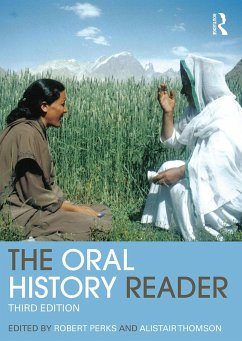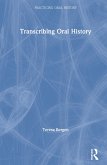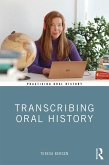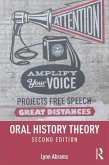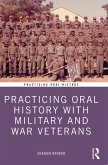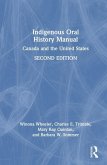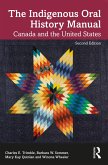The Oral History Reader, now in its third edition, is a comprehensive, international anthology combining major, 'classic' articles with cutting-edge pieces on the theory, method and use of oral history. Twenty-seven new chapters introduce the most significant developments in oral history in the last decade to bring this invaluable text up to date, with new pieces on emotions and the senses, on crisis oral history, current thinking around traumatic memory, the impact of digital mobile technologies, and how oral history is being used in public contexts, with more international examples to draw in work from North and South America, Britain and Europe, Australasia, Asia and Africa.
Arranged in five thematic sections, each with an introduction by the editors to contextualise the selection and review relevant literature, articles in this collection draw upon diverse oral history experiences to examine issues including:
Key debates in the development of oral history over the past seventy years
First hand reflections on interview practice, and issues posed by the interview relationship
The nature of memory and its significance in oral history
The practical and ethical issues surrounding the interpretation, presentation and public use of oral testimonies
how oral history projects contribute to the study of the past and involve the wider community.
The challenges and contributions of oral history projects committed to advocacy and empowerment
With a revised and updated bibliography and useful contacts list, as well as a dedicated online resources page, this third edition of The Oral History Reader is the perfect tool for those encountering oral history for the first time, as well as for seasoned practitioners.
Arranged in five thematic sections, each with an introduction by the editors to contextualise the selection and review relevant literature, articles in this collection draw upon diverse oral history experiences to examine issues including:
Key debates in the development of oral history over the past seventy years
First hand reflections on interview practice, and issues posed by the interview relationship
The nature of memory and its significance in oral history
The practical and ethical issues surrounding the interpretation, presentation and public use of oral testimonies
how oral history projects contribute to the study of the past and involve the wider community.
The challenges and contributions of oral history projects committed to advocacy and empowerment
With a revised and updated bibliography and useful contacts list, as well as a dedicated online resources page, this third edition of The Oral History Reader is the perfect tool for those encountering oral history for the first time, as well as for seasoned practitioners.
Praise of this edition:
"The Oral History Reader continues to be an invaluable resource for students and teachers of oral history, covering a broad range of themes and providing a comprehensive source of theoretical and practical information for, and from, oral historians around the globe."
Sue Anderson, University of South Australia and President of Oral History Australia
"The first two editions of the Oral History Reader have been a key text for successive generations of oral history students and practitioners. The thoroughly updated third edition will have the same essential status with today's interviewers. Comprehensively covering all aspects of oral history theory and practice, Perks and Thomson ensure that the classics of oral history writing sit side by side with the best of contemporary scholarship."
Andrew Flinn, University College London, UK
"An accessible text suitable for any university-level oral history course, The Oral History Reader condenses oral history's full complexity through a range of articles, some classics in the field, others pushing new boundaries. All ask provocative questions that will engender important discussion and critical debate, and will well prepare students who venture out into the field."
Elise Chenier, Simon Fraser University, Canada
"I would recommend this functional and thought-provoking collection to all who are interested in refreshing their own oral history work as well as to those looking to introduce the basics and the nuances of oral history in a higher-education classroom."
Sarah Milligan, Oral History Review
Praise of previous editions:
'This is the book I've been waiting for: a fat, stimulating and carefully selected and edited collection of significant contributions on oral history theory and practice....I recommend it to anyone embarking on or already immersed in the challenges, delights and stimulation of oral history work' - Oral History
'It provides a rich resource for oral history students, practitioners and researchers in diverse settings. And it offers more traditional historians another powerful perspective on history' - Social History of Medicine
'By far the most comprehensive, valuable collection of articles on the topic in the English language...Their historical sweep, from some of the earliest pieces on interviewing to the recent explorations of the use of new technology, offer something to both the novice and the seasoned practitioner...The remarkable collection is a boon to students and teachers alike' - Sherna Berger Gluck, Oral History Program California State University, Long Beach
'Such a clever and well-informed selection... The Oral History Reader 2006 is an affirmation that second (and subsequent editions) are important... This second edition of The Oral History Reader will certainly remain a prescribed text for my students and essential reading for anyone interested in oral history.' Janis Wilton, Oral History
'Oral history sits at the frontiers of the disciplines and activities that it traverses and as such, does keep pushing boundaries, and that pushing is well represented here.' Janis Wilton, Oral History 2007
The Oral History Reader, in its second edition, is more than a sampling of the field; the organization, introduction and selections policy will influence that way oral history develops in this new century'. Valerie Yow, OUP Journal
'This book has depth as well as breadth... Each section contains articles remarkable for insights and spurs to thinking. I whole-heartedly recommend the Oral History Reader both to the seasoned practitioner ahead of current thinking in the field of oral history and also to the instructor considering adopting this inclusive and stimulating text for newcomers to oral history.' - The Oral History Review
"The Oral History Reader continues to be an invaluable resource for students and teachers of oral history, covering a broad range of themes and providing a comprehensive source of theoretical and practical information for, and from, oral historians around the globe."
Sue Anderson, University of South Australia and President of Oral History Australia
"The first two editions of the Oral History Reader have been a key text for successive generations of oral history students and practitioners. The thoroughly updated third edition will have the same essential status with today's interviewers. Comprehensively covering all aspects of oral history theory and practice, Perks and Thomson ensure that the classics of oral history writing sit side by side with the best of contemporary scholarship."
Andrew Flinn, University College London, UK
"An accessible text suitable for any university-level oral history course, The Oral History Reader condenses oral history's full complexity through a range of articles, some classics in the field, others pushing new boundaries. All ask provocative questions that will engender important discussion and critical debate, and will well prepare students who venture out into the field."
Elise Chenier, Simon Fraser University, Canada
"I would recommend this functional and thought-provoking collection to all who are interested in refreshing their own oral history work as well as to those looking to introduce the basics and the nuances of oral history in a higher-education classroom."
Sarah Milligan, Oral History Review
Praise of previous editions:
'This is the book I've been waiting for: a fat, stimulating and carefully selected and edited collection of significant contributions on oral history theory and practice....I recommend it to anyone embarking on or already immersed in the challenges, delights and stimulation of oral history work' - Oral History
'It provides a rich resource for oral history students, practitioners and researchers in diverse settings. And it offers more traditional historians another powerful perspective on history' - Social History of Medicine
'By far the most comprehensive, valuable collection of articles on the topic in the English language...Their historical sweep, from some of the earliest pieces on interviewing to the recent explorations of the use of new technology, offer something to both the novice and the seasoned practitioner...The remarkable collection is a boon to students and teachers alike' - Sherna Berger Gluck, Oral History Program California State University, Long Beach
'Such a clever and well-informed selection... The Oral History Reader 2006 is an affirmation that second (and subsequent editions) are important... This second edition of The Oral History Reader will certainly remain a prescribed text for my students and essential reading for anyone interested in oral history.' Janis Wilton, Oral History
'Oral history sits at the frontiers of the disciplines and activities that it traverses and as such, does keep pushing boundaries, and that pushing is well represented here.' Janis Wilton, Oral History 2007
The Oral History Reader, in its second edition, is more than a sampling of the field; the organization, introduction and selections policy will influence that way oral history develops in this new century'. Valerie Yow, OUP Journal
'This book has depth as well as breadth... Each section contains articles remarkable for insights and spurs to thinking. I whole-heartedly recommend the Oral History Reader both to the seasoned practitioner ahead of current thinking in the field of oral history and also to the instructor considering adopting this inclusive and stimulating text for newcomers to oral history.' - The Oral History Review

